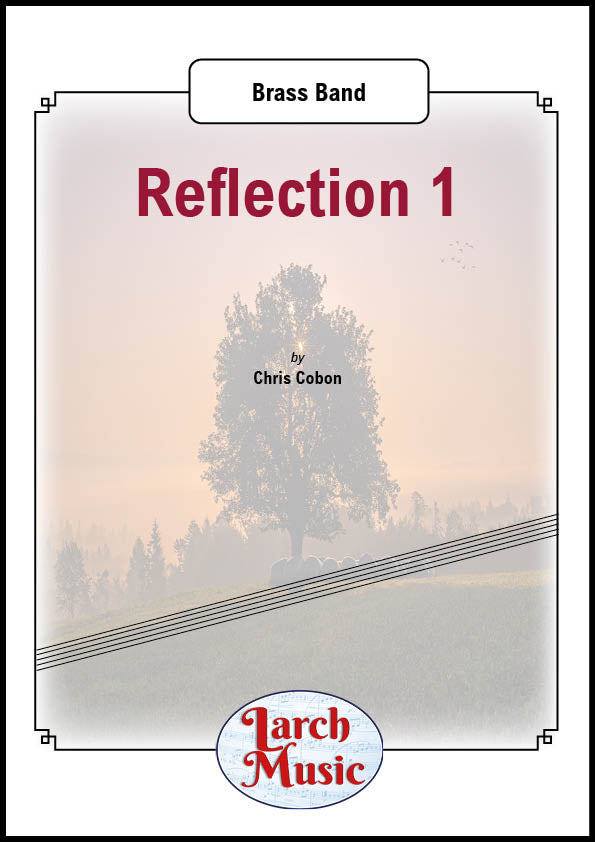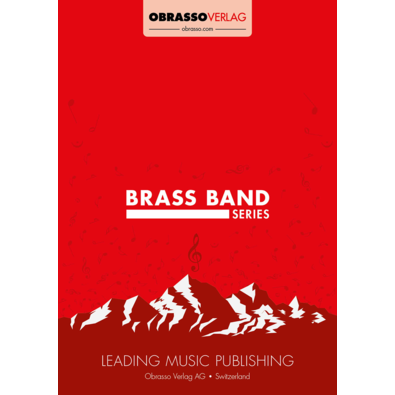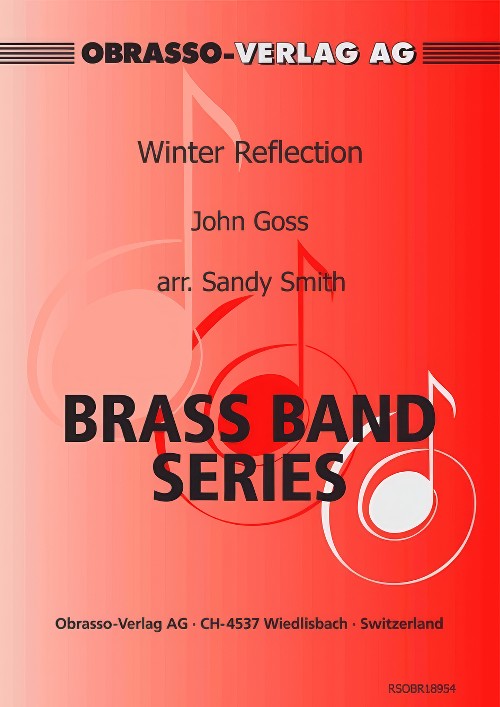Results
-
£84.00
Reflection (Bra) - Nick Van Elsen
Reflection' is written for the wind band of the 'Kunstacademie Noord-Limburg' conducted by Tom D' Joos, this orchestra also worked on 'Klankspiegelingen', a bigger project on the occasion of the first anniversary of the carillon in Neerpelt. The composer distilled a number of themes for his choral 'Reflection'.
Estimated dispatch 7-14 working days
-
 £25.00
£25.00Reflection 1 - Brass Band - LM228
COMPOSER: Chris CobonA great concert piece from the pen of Chris CobonReflect on the days gone by with this wonderful tune.One to add to your concerts this year and sure to be a crowd pleaser.Sure to be an earworm after your concert.
In Stock: Estimated dispatch 3-5 working days
-
 £56.00
£56.00 -
 £86.30
£86.30 -
 £115.00
£115.00Dear Reflection - Dennis Armitage
Estimated dispatch 5-14 working days
-
 £56.00
£56.00Winter Reflection (Brass Band - Score and Parts) - Goss, John - Smith, Sandy
Based on See Amid the Winter's Snow
Estimated dispatch 7-14 working days
-
 £64.00
£64.00REFLECTION OF COLOURS (Brass Band) - Trachsel, Thomas
Sinfonietta No 3 Passacaglia - green; Elegy - blue; Finale Furioso - red. Grade: Advanced
Estimated dispatch 7-14 working days
-
£29.50
So Amazing - Traditional - Jonathan Mead
'So Amazing', is a beautiful new hymn tune arrangement from the pen of Welsh Composer Jonathan Mead. The music would create a lovely moment in a concert, where the audience would have time for reflection. The title comes from the words that are often associated with this tune, 'Love so amazing, so divine,'. The tune used, is also well known in the brass band world as, 'The Water is wide'. The music is lovely to play as well as listen to. A must for any Concert Programme.
In Stock: Estimated dispatch 1-3 working days
-
 £32.99
£32.99In Praise of Him - Tone Poem Joseph Knight
This original composition is a short reflection on the sweetness of praise to our Lord Jesus. It is my own personal reflection. It starts with a soft sweet melody on horns which is varied and moves throughout the band. The piece is in ternary form and as the melody develops it returns one tone higher, signifying rising praise. It then finishes rousingly with a steadily increasing "Halleluiah" to finish. The piece lasts nearly four minutes and would grace any concert as a character piece.
Estimated dispatch 5-9 working days
-
 £44.45
£44.45Abberline (Euphonium Solo with Brass Band) Karl Whelan
Inspired by the infamous investigation into Jack the Ripper, Abberline follows Detective Inspector Frederick Abberline through the mist-shrouded streets of Victorian London in his desperate pursuit of a killer who remains forever just out of reach. Scored for brass band and solo euphonium, the piece blends atmospheric textures, shifting musical identities, and virtuosic demands to capture a narrative that is as haunting as it is unresolved. The piece opens in a world of shadows - the foggy alleys of Whitechapel - where tension simmers beneath the surface. The euphonium enters cautiously, as if stalking unseen figures, echoing the danger and uncertainty that cloaked the city in fear. This eerie calm is broken suddenly: the Ripper strikes. The moment is brief but brutal, leaving only silence and horror in its wake. From here, the music shifts into an uneasy, angular waltz: the figure of Abberline takes center stage, portrayed by the soloist as he investigates the aftermath. The waltz is melodically off-kilter and harmonically unstable, capturing both the grotesque nature of the crime and the detective's mental burden. The scene then returns to the streets - but this time, the musical material is more intricate, fragmented, and tense. The threat has deepened, and again the silence is shattered by violence. A second, slightly altered waltz follows, further reflecting Abberline's obsessive descent into the case. In the final section, the chase begins in earnest. Themes from earlier return in quick succession, intensified and overlapping as time runs out. The ancient Dies Irae chant is woven into the texture, evoking fate and judgment. In a final, erratic surge, the euphonium and band race toward an ending that is breathless and unresolved - a reflection of history's unanswered questions and the ghost that always stayed one step ahead. To view a rolling score video of the work please visit https://www.youtube.com/watch?v=i59xYzJRMaI Duration: approx. 7.30 minutes This PDF download includes parts and score. Sheet music available at www.brassband.co.uk (UK) or www.cimarronmusic.com (USA) Instrumentation: Euphonium Soloist Bb Soprano Cornet Eb Solo Cornet 1-2 & 3-4 Bb Repiano Cornet Bb 2nd Cornet Bb 3rd Cornet Bb Flugel Horn Bb Solo Horn Eb 1st Horn Eb 2nd Horn Eb 1st Baritone Bb 2nd Baritone Bb 1st Trombone Bb 2nd Trombone Bb Bass Trombone Euphonium (tutti) Bb Bass Eb Bass Bb Timpani Percussion 1-3
In Stock: Estimated dispatch 1-3 working days

